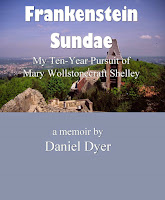And then—the
very next day—I got the news that a Harmon student, an eighth-grader, had
committed suicide, and suddenly my self-absorbed, self-pitying emotions tumbled
into a chasm of irrelevance. I’d not taught the boy, but I knew who he was—knew
his family.
That same
day—June 7, 1997—I have this note in my journal: Joyce found a house in Hudson she kind of likes, so we’re going to look
at it tomorrow at noon. And the next day I wrote this: over to Hudson for 12 noon appointment to see house on Church Street;
we both liked it; at home decided to investigate obtaining a bridge loan until
we sell this house (asking price is $219.9K for the Hudson place); if it works,
okay; if not, that’s okay, too; staying here is certainly no penalty.
I am typing
these words right now in that very house in Hudson we first saw when I was
reading Lodore. We had been living in
a great place in Aurora—a lovely brick home built in the early nineteenth
century. We’d invested a lot in its restoration. Convenience was one of its
great virtues: Harmon Middle School (where I taught) was about two blocks away,
and Joyce’s mom, deep in her struggle with Alzheimer’s, was living out at Anna
Maria, a care facility just a couple of miles away. And Joyce was teaching at
Hiram College—just eleven miles east with only one stoplight between our house
and her office.
But now I
was retired; Joyce’s mom had died; we missed Hudson (where we had lived for twenty-one
years, 1979–1990), especially being within easy walking distance of the
downtown area. This Hudson house we were looking at, also a century home, was
barely even a block from the village green. And right next door—the funeral
home, which I began referring to as our Stage-Two Retirement Facility. Joyce
found that locution far less amusing than I did.
For the next
few days my journal was full of new-house business. Talks with realtors,
bankers. We made an offer (barely below the asking price) at 5:30 in the
evening; the sellers accepted it with alacrity (which, of course, made me
wonder, wonder, wonder).
On June 10,
I attended the sad service for the Harmon student—saw many former students,
some of whom had written poems for the occasion.
On June 12,
I biked up to the Aurora Mickey D’s and read more of Lodore. I biked home and finished it in my study, where, as my journal
reminds me, I had tears streaming down my
face as Ethel finally discovers her mother, who has surrendered everything for
her daughter;MWS needed a good editor (PBS would have done well!), but she has
the power to animate emotions, that’s for sure—romantic, to be sure, but I’m an
old softie anyway, so I love it ….
One of the
things I’d been thinking about—even so very early in my Mary Shelley research—was
how the loss of her husband, grievous in many ways, had an additional dimension:
She lost the best reader and editor she would ever have. There has been some
foolish talk here and there about how Bysshe “wrote” Frankenstein, foolish talk that withers after you look at her
manuscript. He has some suggestions—good ones—but it’s her writing, all the way.
But having
some very bright and able eyes in the house is—as I can testify personally—a tremendous
advantage for a writer. Joyce looks over almost all of my work before I do
anything with it (I do the same for her), and her ideas have had an
incalculable effect on my work—and, of course, on me. So Mary, who had had Percy
Bysshe Shelley in the house to look at her work, to talk with, to share
ideas with, would suffer in the ensuing years from his absence—in so many ways.
And by the
way … we sold our Aurora house very quickly, too, that summer of 1997. And the buyer
was one of my former students. And now it’s been about twenty years that we’ve
lived in the house we were considering while I finished Mary’s Lodore.


No comments:
Post a Comment